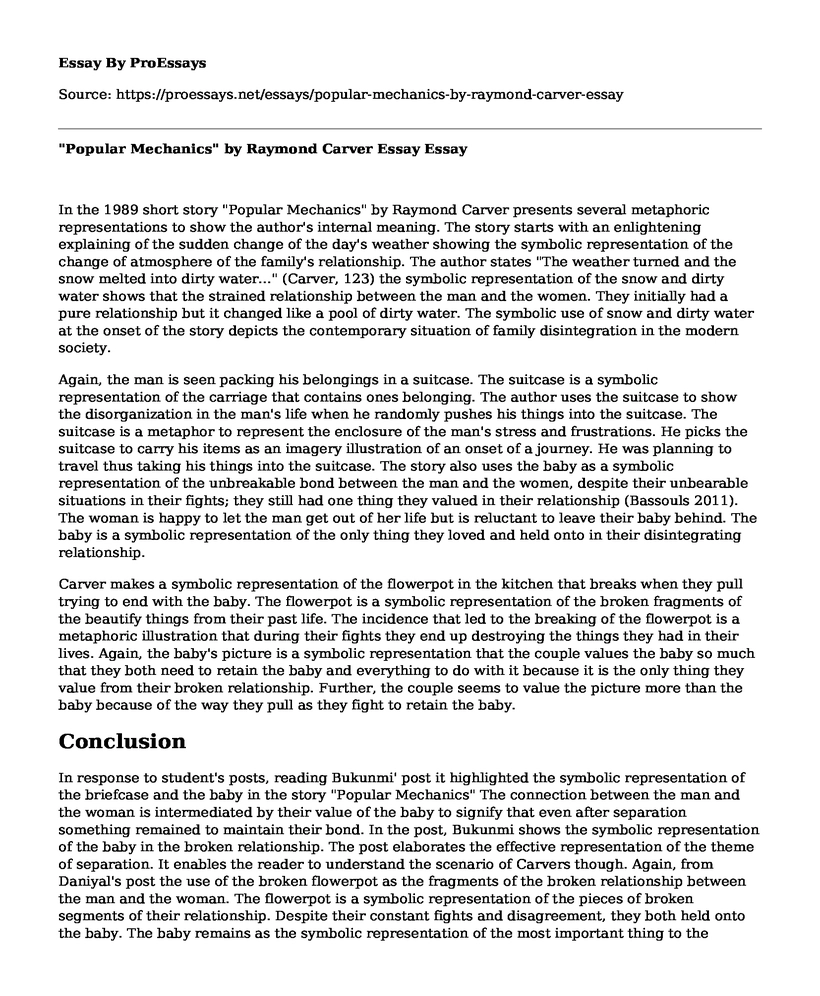In the 1989 short story "Popular Mechanics" by Raymond Carver presents several metaphoric representations to show the author's internal meaning. The story starts with an enlightening explaining of the sudden change of the day's weather showing the symbolic representation of the change of atmosphere of the family's relationship. The author states "The weather turned and the snow melted into dirty water..." (Carver, 123) the symbolic representation of the snow and dirty water shows that the strained relationship between the man and the women. They initially had a pure relationship but it changed like a pool of dirty water. The symbolic use of snow and dirty water at the onset of the story depicts the contemporary situation of family disintegration in the modern society.
Again, the man is seen packing his belongings in a suitcase. The suitcase is a symbolic representation of the carriage that contains ones belonging. The author uses the suitcase to show the disorganization in the man's life when he randomly pushes his things into the suitcase. The suitcase is a metaphor to represent the enclosure of the man's stress and frustrations. He picks the suitcase to carry his items as an imagery illustration of an onset of a journey. He was planning to travel thus taking his things into the suitcase. The story also uses the baby as a symbolic representation of the unbreakable bond between the man and the women, despite their unbearable situations in their fights; they still had one thing they valued in their relationship (Bassouls 2011). The woman is happy to let the man get out of her life but is reluctant to leave their baby behind. The baby is a symbolic representation of the only thing they loved and held onto in their disintegrating relationship.
Carver makes a symbolic representation of the flowerpot in the kitchen that breaks when they pull trying to end with the baby. The flowerpot is a symbolic representation of the broken fragments of the beautify things from their past life. The incidence that led to the breaking of the flowerpot is a metaphoric illustration that during their fights they end up destroying the things they had in their lives. Again, the baby's picture is a symbolic representation that the couple values the baby so much that they both need to retain the baby and everything to do with it because it is the only thing they value from their broken relationship. Further, the couple seems to value the picture more than the baby because of the way they pull as they fight to retain the baby.
Conclusion
In response to student's posts, reading Bukunmi' post it highlighted the symbolic representation of the briefcase and the baby in the story "Popular Mechanics" The connection between the man and the woman is intermediated by their value of the baby to signify that even after separation something remained to maintain their bond. In the post, Bukunmi shows the symbolic representation of the baby in the broken relationship. The post elaborates the effective representation of the theme of separation. It enables the reader to understand the scenario of Carvers though. Again, from Daniyal's post the use of the broken flowerpot as the fragments of the broken relationship between the man and the woman. The flowerpot is a symbolic representation of the pieces of broken segments of their relationship. Despite their constant fights and disagreement, they both held onto the baby. The baby remains as the symbolic representation of the most important thing to the couple. The baby remains as the treasure that both parties hold with prestige and would want to remain with, therefore, they still loved or had something they valued in their broken relationship.
Works cited
Bassouls, Sophia. Raymond Carver's Popular Mechanics, 1981: Short Stories for Students, Cengage Learning, 2011, Vol 32, pp. 208 - 230.
Carver, Raymond. Popular Mechanics: What we Talk about when we Talk about Love. New York: Random, 1989, 123 - 125.
Cite this page
"Popular Mechanics" by Raymond Carver Essay. (2022, Jun 17). Retrieved from https://proessays.net/essays/popular-mechanics-by-raymond-carver-essay
If you are the original author of this essay and no longer wish to have it published on the ProEssays website, please click below to request its removal:
- Critical Analysis of 1984 Essay
- Literary Analysis of the Yellow Wallpaper
- Poetry Analysis Essay on For My People by Margaret Walker
- Comparison of the Tragic Hero from Agamemnon and Oedipus the King Essay
- Questions on the Mahabharata's the Epic Story Paper Example
- Essay on Man vs. Man: The Fight for Survival in Lord of the Flies and The Most Dangerous Game
- Essay Example on Unlocking the Power of Poetry: Literary Devices, Moods, and Language







